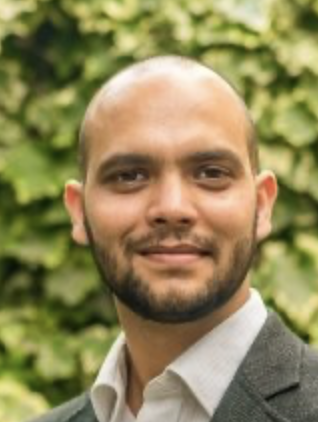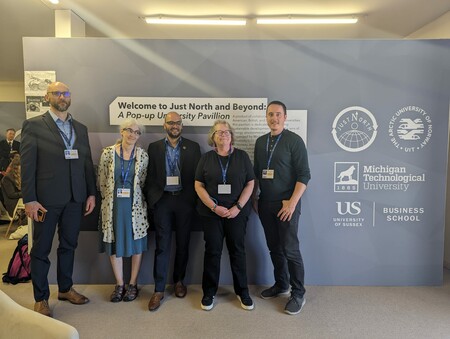
It has been almost 33 years since Dr. Carl Sagan testified in front of Congress about greenhouse gas (GHG) emissions and their effect on our planet. Dr. Sagan, one of my favorite science communicators, passed away one year after the Conference of Parties (COP) met for the first time in Bonn, Germany. This year is the 28th time the COP will meet in Dubai, United Arab Emirates, from 30th November to 12th December. I believe given that human-induced climate change is now an even more significant challenge and threat than it was 33 years back, with visible and scientific evidence of global loss and damages, it is imperative now that we engage in an equitable global dialogue and learnings through the platform of the annual United Nations climate change conference, commonly referred to as COP.
Huskies Host Pavilion
This year, in 2023, is the fourth time Michigan Tech students and faculty members will attend and participate in COP, which is the largest platform for global policy dialogue and engagement for global climate governance. Unlike the previous three times, Tech will be hosting a pavilion. Through the pavilion, Michigan Tech actively engages multiple stakeholder groups, including but not limited to representatives from indigenous communities, academics, international nongovernmental organizations, government agencies, and youth.
A Conference Not Without Controversy
There is and always has been skepticism around climate change and more so around a climate change conference that brings people from around the globe to engage in discussion, policy-making, and knowledge sharing around COP. The colloquial conversation, and I am paraphrasing here, is “People are flying and emitting GHGs to go to a conference to talk about reducing GHGs.” I agree that unnecessary energy use and wastage should be heavily criticized. However, is going to a conference, which is the most prominent policy platform, to engage and to find a solution to an agreed-upon problem really an unnecessary GHG emission? I would go with the answer, no, it’s not, and in this blog post, I will briefly provide two primary arguments for the same while thinking about students and researchers as the primary stakeholders.

Youth and Student Engagement Plays a Big Role
In academia, it is a standard practice to go to academic conferences in every field. It is encouraged because that is where you learn about the latest research activity in that field. The students and professors at these conferences engage with people who are doing similar and state-of-the-art research work. COP, in this sense, is no different than an academic conference with space for researchers to engage in academic dialogue. COP is a melting pot for researchers coming from science and policy fields, sharing and learning from each other on how science is informing global climate policies. Hence, if we don’t criticize students and researchers attending a typical academic conference, why push back against climate change conferences both from the emission and need perspectives?
Second, we rightfully now agree that today’s youth (I am not saying “we” because now I don’t qualify as a youth, even though I want to believe that I am still young) are the future of tomorrow. They will be affected the most by the impact of climate change-induced extreme weather events. Hence, it is important for the youth to learn about the science and policy-making for climate change. If we agree that education is essential, we can make the case that it is vital to learn where and how the global climate governance process occurs. COP is arguably the best platform for students to learn about the actors, interests, and institutions involved in the process. Today’s students are scientists and policymakers for tomorrow, and COP is a platform to learn and engage with scientists and policymakers formulating policies for global climate governance. One student told me, “COP is like a mini internship.” Would we not fly to where we have an internship if that was the only means of traveling there?
Engagement Solves Problems
I believe engagement is key to solving either a local challenge or a global challenge like climate change that transcends national boundaries. COP provides that platform to engage and learn, and more students and researchers must engage on this platform. The engagement will lead to a more comprehensive and hopefully urgent approach by current and future policymakers to address the challenges that we are and will face due to climate change.
About COP28
Michigan Technological University is one of a handful of universities taking a leading role at the 28th Conference of the Parties to the UN Framework Convention on Climate Change (COP28) from November 30 to December 12, 2023. Hosted by the UAE at Expo City Dubai, COP28 is the largest climate change-focused event in the world. COP28 aims to unite the world towards agreement on bold, practical, and ambitious solutions to the most pressing global challenge of our time. You can read more about the Huskies’ presence at COP28 in the Huskies at the UN Climate Conference (COP) blog.